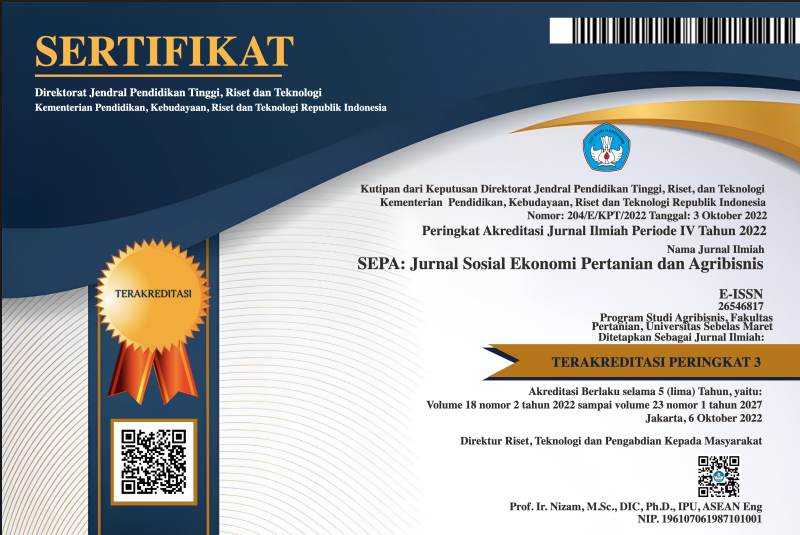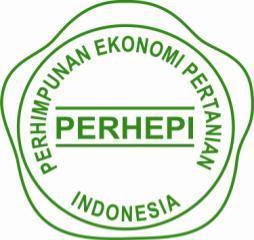RESILIENSI MASYARAKAT NELAYAN SELAMA MUSIM LAEB DI DESA PUGER KULON KECAMATAN PUGER KABUPATEN JEMBER
Abstract
The laeb season struck some coastal areas in the southern part of Java that occurred as an impact of climate anomalies. This condition is experienced by the fishermen in Puger Kulon village, Puger sub-district, especially fishermen who catch Lemuru and Benggol fish due to the difficulties to get fish when the unsuitable sea conditions. This condition causes fishermen to experience difficulties in maintaining social resilience that can affect the lives of their families. The research aims to decide the resilience of the Jukung fishermen in the current laeb by formulating the utilization of livelihood assets to keep the lives of fishermen. The Data is collected using three methods, namely interviews, observations and documentation studies. The key informant is deliberately determined that Jukung fishermen and supporting informant are the wives of fishermen and the staff of TPI. The data is analyzed by using Miles and Huberman. The validity method uses triangulation and source techniques. The result show that 1) Jukung fishermen will resilien during the Laeb season when the Jukung fishermen can use their livelihood assets both in household assets as well as in the living system of Jukung fishermen. Livelihood assets consist of human capital, natural capital, physical capital, financial capital, and social capital. The fishermen need to reduce or minimize capital in certain conditions in order to resilient without causing a new burden and vulnerability for Jukung fishermen in Puger Kulon village.
Keywords
Full Text:
PDFReferences
Ellis, F. (2000). Rural livelihoods and diversity in developing countries. Oxford University Press.: UK.
Kusnadi. 2000. Nelayan: Strategi Adaptasi dan Jaringan Sosial. LKiS : Yogyakarta
Mayunga, Joseph S. 2007. Understanding and Applying the Concept of Community Disaster Resilience: A Capital-Based Approach. Working Paper Prepared for The Summer Academy, Megacities as Hotspots of Risk: Sosial Vulnerability and Resilience Building, Munich, Germany, 22-28 Juli 2007.
Moegni, Nurtjahja, Ahamd R. dan Gigih P. 2014. Adaptasi Nelayan Perikanan Laut Tangkap dalam Menghadapi Perubahan Iklim. Ekonomi dan Studi Pembangunan, 15(2) : 182-189.
Speranza, Chinwe I, Urs Wiesmann, dan Stephan Rist. 2012. An Indicator Framework for Assessing Livelihood Resilience in The Context of Sosial-Ecological Dynamics. Global Environmental Change, 28(1) : 109-119.
Sugiyono. 2013. Metode Penelitian Kuantitatif Kualitatif dan R&D. Bandung: Alfabeta.
Sugiono. 2016. Metode Penelitian Kuantitatif Kualitatif dan R&D. Bandung: Alfabeta
Wahyono, Ari, Masyhuri I.,dan Ibnu N. 2014a. Resiliensi Komunitas Nelayan dalam Menghadapi Perubahan Iklim: Kasus di Desa Grajagan Pantai, Banyuwangi, Jawa Timur. Masyarakat dan Budaya, 16(2): 259-274.
Walker, B., et al.2004. Resilience, Adaptability and Transformability in Social-ecological Systems. Ecology and Society, 9(2) : 5.
Wijayani, Fika. 2016. Strategi Keluarga Nelayan dalam Mengatasi Kemiskinan. Skripsi. Diterbitkan. Jurusan Pendidikan Luar Sekolah Fakultas Ilmu Pendidikan Universitas Yogyakarta, Yogyakarta
Wibowo, 2011. Cara Cerdas Menulis Artikel Ilmiah. Jakarta: Kompas Media Nusantara.
DOI: https://doi.org/10.20961/sepa.v16i2.33792
Refbacks
- There are currently no refbacks.



.png)







.png)
3.png)





